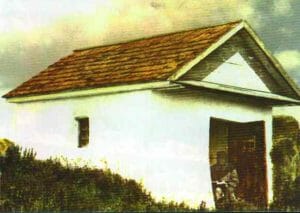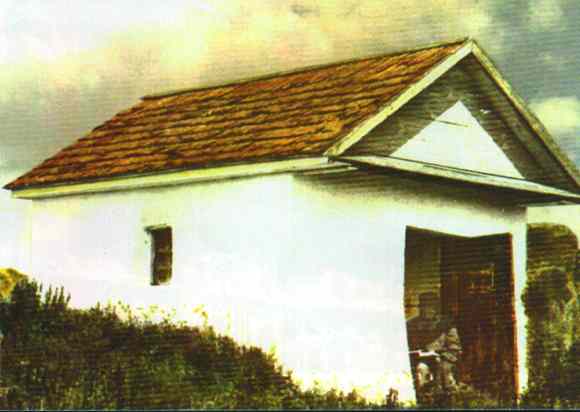REBBE NACHMAN’S DREAM
In the month of Kislev in 5570 (1809), Rebbe Nachman dreamt a dream that was shrouded in mystery for more than 203 years. Rebbe Nachman taught that dreams should only be written down if you want them to come true. This particular dream that he’d had he had was so awful, the Rebbe had cried for a full day after he’d dreamt it, yet Rebbe Nachman still insisted that it should be written down and even publicised. None of his students or followers had any explanation as to why this should be the case.
There was a tradition within Breslev that only when the Jewish people approached the end of days would the matter be understood. You can read the full dream for yourself in the book “Chayey Moharan” (in Hebrew), or in English, in the book ‘Tzaddik’, published by the Breslov Research Institute in the section called New Stories. This is the dream that Rebbe Nachman had:
I was sitting in my room, but not even a single person came to see me. I was very surprised by this, so I went to a different room, but there wasn’t a single person there, either. I went to the large house, and the study hall, but there wasn’t a single person in either of those places, either.
So I thought I would go outside. I went outside, and saw there rows and rows of people standing about and whispering amongst themselves. One person would make a comment about me, and and someone else would snigger, and then yet another person would pull a face at me. Even my own followers were against me. Some of them looked at me in a very arrogant way, while others were telling each other secrets about me, etc.
I called one of my followers over and asked him: “What’s going on?”
He replied: “How could you do such a thing?!1” I still had absolutely no idea why everyone was telling jokes about me. So I asked this man to go and gather a few of my followers together. He left me – and I didn’t see him again. So I started thinking to myself what I should do next. I decided to leave, and to go to another country.
I arrived there – but things were exactly the same. Even there, people knew about the situation and were standing around and talking about it. So, I thought I would go and live in a forest somewhere. Five of my followers joined me, and we went together to live in the forest. Whenever we need to eat something, etc, we’d send one of the men out to get us what we needed. I used to ask him if the uproar had died down yet, but he answered: ‘No. It’s still very fierce.”
While we were living there, an old man came and called me, and told me he had something to tell me. So I went with him, and he started saying: “How do you dare to do such a thing?! Can’t you see how you’ve put your ancestors to shame – your grandfather, Rabbi Nachman Horodenka, and your great-grandfather, the Baal Shem Tov, ZTL? Think of the holy Torah! Think of the Patriarchs, Avraham, Yitzhak and Yaacov! Aren’t you ashamed of yourself?! How can you even think about staying here? Can you stay here forever? Your money will run out; you’re physically weak. What are you going to do?
“And what’s with the idea of running away to a different country? However you look at it, it’s not going to help you, because if they don’t already know who you are they won’t give you any money. And if they do already know who you are, then you still won’t be able to stay there because they’ll already know all about this situation.”
I replied: “If that’s how things are, and I’m simply a fugitive, then at least I’ll still have the World to Come.” “You really think you’re going to have the World to Come?!” he answered. “After sinning like this, you couldn’t even find a place to hide yourself in Hell!2”
“Go!” I said. “I hoped you would have comforted me, and spoken kind words to me. Now you’re only just making things more painful. Get away from me!” So the old man went away.
While I was staying there [in the forest] I thought to myself: “If I’m staying here for such a long time, chances are I could completely forget my learning. So I asked the man who used to go into the city for us to try and find a [Torah] book there, and to bring it back to me. He went to the city, but he didn’t end up bringing back a book. He said it had been impossible to do it, because he couldn’t tell anyone who the book was for, but it was also impossible to find a [Torah] book secretly. I suffered a great deal, because not only was I a fugitive, I also didn’t even have a [Torah] book. Because a person can end up completely forgetting all of their learning.
Later, the old man came back, carrying a book under his arm. I asked him: “What have you got there?” And he replied: “A book.” I asked him to give it to me, and he did. I took the book, but found that I had no idea how to position it. I opened it, but I found I couldn’t understand a word of it – it was as though it was written in a different language, and a different alphabet. I couldn’t understand it at all, and this was very painful to me. I was also afraid that the men who were with me would leave me, if they found out about this.
The old man called me over to him again, to speak to me. I went, and he started berating me again, as he’d done before: “How could you do such a thing?! Aren’t you ashamed of yourself?! Even in hell, you’ll have nowhere to hide!”
I said to him: “If it was someone from the Upper World who was telling me this, I would believe him.” He told me: “I’m from there!” and then he showed me a sign. Then, I started thinking about the famous story about the Baal Shem Tov, where the Baal Shem Tov thought that he wouldn’t be given any share in the World to Come, but he said anyway: “I love God, even without the World to Come.”
In great bitterness, I threw my head down and turned away. As soon as I did that, all the different people the old man said I had shamed appeared in front of me – my grandfather and great-grandfather, the patriarchs, etc – and they quoted the verse: “and the fruit of the land for excellence and proud beauty (Isiaiah 4:2). They said to me: “On the contrary, we will be proud of you.”
They brought all of my followers and children to me (because even my children had left me when all this had begun) and they spoke kind words to me – the opposite of what had happened beforehand.
As to my throwing my head down in bitterness… If someone who had transgressed the whole Torah 800 times had thrown his head down as bitterly as that, he would certainly have been forgiven. I don’t want to tell you the other great goodness contained in this [the dream], but it was most certainly good!
This is the end of the dream as related by Rebbe Nachman and quoted in Chayey Moharan.
If we take a look at the full verse quoted in the dream from Isiaiah, we find it says the following: “And on that day, there will be a plant of Hashem for glory and honor, and the fruit of the land for excellence and proud beauty.”
According to a number of commentators, including the Targum Yonaton, the Radak, and the Metzudot, the words ‘and on that day’ refer to the time of redemption, and the ‘plant of Hashem’ refers to Moshiach ben David, who’s often referred to as a ‘sprout’ or ‘shoot’. The idea is that Moshiach will be revealed in the same way as a plant, which initially starts off as a small, buried seed that everyone thinks is buried and decaying. But it’s precisely in the midst of all that rotting and decay that the plant itself starts to grow, and slowly, slowly starts to reveal itself in the world.
When the Gemara in Tractate Sanhedrin refers to the Moshiach as being ‘Bar Nofli’ (the fallen one), it’s describing this phenomenon of how the Moshiach will sacrifice himself so much for the nation, and will fall to the lowest depths, as though he’s been buried alive, solely in order to rise up again, and to bring the whole world up with him.
The Radak also explains that when the verse in Isaiah is talking about the ‘fruit of the land’, this is also a reference to Moshiach, who will bring great joy to his fellow Jews. This will be particularly true after the war of Gog and Magog, when all of the country will be quiet and peaceful, and the nations of the world will be in awe of the Moshiach.
But the Radak also explains that not everyone will merit to strengthen themselves in emuna, and to make it through to the end of the redemption process.
In the meantime, the terrible suffering and the exile that the Tzaddik has to take upon himself is certainly cause for weeping; but at the same time, ultimately, ‘most certainly it was good!’. That can explain why Rebbe Nachman cried bitterly about this dream but at the same time wanted it to come true. It’s written in the Midrash that Moshiach chose to endure all the terrible suffering he is subjected to on behalf of the Jewish people, and suffers it happily, because he sees that the nation of Israel doesn’t have sufficient merit to be redeemed, otherwise.
The midrash states: (Yalkut Yishaya 60:498) “Hashem asks him [Moshiach]: ‘Those people who are protected by you, in the future their sins will cause you to have a yoke of iron placed on you, and they will turn you into a calf [for ploughing], this yoke, and the sins of these people, will dim your eyes and sap your strength. And in the future, your tongue will cleave to its palate. Do you want this?’
“Moshiach replies to Hashem, and says: ‘Master of the Universe, with all my heart, and with tremendous joy in my heart, I accept on myself all of this, in order that there will not be one person lost from Israel. And not only those who are alive should be saved, rather even those that are buried in the earth, that have died since the days of Adam HaRishon until now. This is what I want, and for this I accept [the terrible suffering] upon myself.’
“The Forefathers will say to Moshiach, ‘maybe due to the tremendous suffering that you suffered by the hands of the Jewish People, and because they placed you in prison your mind is not completely at peace with them’, so Moshiach says to them ‘Everything that I’ve done I’ve done only for you and for your children that they should benefit from the goodness that Hashem has bestowed on the Jewish People’.”
The Midrash (Midrash Rabba Bereishit, Parsha לט) also states that just like Avraham went into exile at the age of 75, so the redeemer will also be 75 years old. “Hakadosh Baruch Hu said to Avraham: ‘you left the house of your father at the age of 75, and by your life [I swear] that also the Redeemer that I will bring from you will be 75 years’ old.’ The exile of the Tzaddik is in order to open a path to redemption for them, like Yosef said to his brothers after they had acknowledged him: ‘Hashem sent me before you, to prepare a path in the land for you, and to sustain you with plenty.’”
It’s written in the Baal Haturim, at the end of Parsha Vayechi, that Yosef said: “Just like I ruled for 80 years, so too will come the Redeemer at the age of 80.” From this we can learn that from the age of 75, when Moshiach goes out into exile, until the age of 80, his mission is to complete the work that will lead to the complete redemption.
In Midrash Talpiot (אות א’ ענף אותות משיח) it says that people will say about Moshiach that he has done disgusting things. This is also stated about our first redeemer Moses of whom everyone suspected of adultery (gemara sanhedrin 110).
In another Midrash is says (Pesikta Rabti 34) “‘The Tzaddik who will be redeemed, a poor person riding on a donkey’, This is Moshiach who justifies the deeds of the Jewish People when they were mocking him as he sat in prison and he says to them ‘All of you are my children and all of you shall be redeemed through the great compassion of Hashem'”.

1) 1 The wording here is from the most common versions. However, in the original manuscript it says “How can you do such a thing?! Is it possible that you did such a huge sin?!” as was printed in Lublin 1921 but was censoured from later publications and was recently returned to print by Torat Hanetzach Publications Jerusalem
2) The original manuscript adds “Because you caused a huge chillul hashem” (see note above)

















